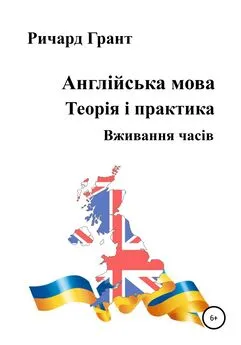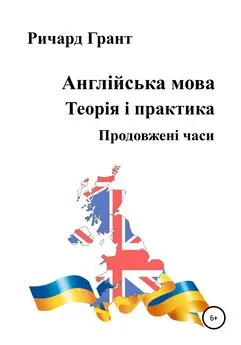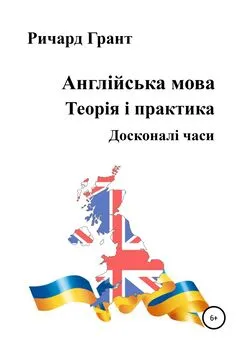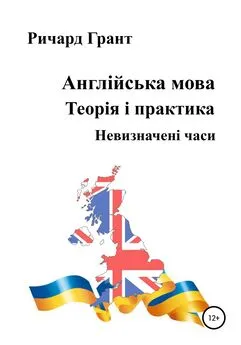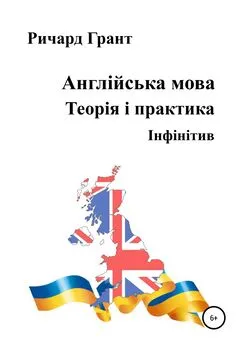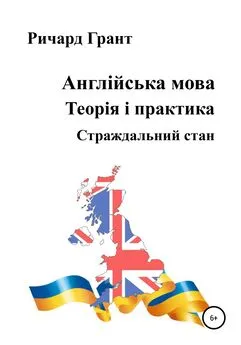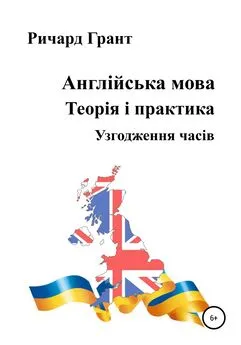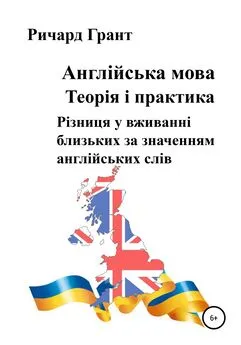Ричард Грант - Англійська мова. Теорія і практика. Вживання часів
- Название:Англійська мова. Теорія і практика. Вживання часів
- Автор:
- Жанр:
- Издательство:неизвестно
- Год:2021
- ISBN:978-5-532-94578-4
- Рейтинг:
- Избранное:Добавить в избранное
-
Отзывы:
-
Ваша оценка:
Ричард Грант - Англійська мова. Теорія і практика. Вживання часів краткое содержание
Освоївши теоретичний матеріал, представлений в цій серії і виконавши більше 600 вправ для самоконтролю, Ваш словниковий запас складатиметься з більше, ніж 6 000 англійських слів і виразів, що дозволить Вам успішно скласти такі міжнародні іспити по англійській мові, як TOEFL(Test of English as a Foreign Language), IELTS(International English Language Testing System) і інші.
Англійська мова. Теорія і практика. Вживання часів - читать онлайн бесплатно ознакомительный отрывок
Интервал:
Закладка:
Вправа 23
Розкрийте дужки, вживаючи дієслова у Past Simple або Past Continuous.
1. When I ( to go) to school, I ( to meet) my friend. 2. I ( to walk) along the street with my friend when a tram ( to pass). 3. When my friend ( to come) to see me, I ( to do) my homework. 4. They ( to play) in the yard the whole evening yesterday. 5. He ( to leave) the bank, when the thieves ( to take) his money. 6. Yesterday he ( to write) a letter to his friend. 7. I ( not to see) Mike last week. 8. I ( to see) Mike when he (to cross) the street. 9. When we were in the country last summer, I ( to go) to the woods one day. In the woods I ( to find) a little fox cub. It could not run. It ( to injure) its leg. I ( to decide) to help the cub. I ( to bring) it home. Every day I ( to feed) it and ( to take) care of it. I ( to do) it the whole summer. Now the fox cub is quite well. It ( to leave) my house. It lives in the woods again. 10. Why she ( to sleep) at seven o’clock yesterday? 11. When we ( to go) to the cinema, we ( to meet) grandmother. 12. She ( to look) out of the window when I ( to see) her. 13. When I ( to go) to the stadium, I ( to meet) Kate and Ann. 14. I ( to clean) my teeth at eight o’clock in the morning yesterday.
Вправа 24
Розкрийте дужки, вживаючи дієслова у Past Simple або Past Continuous.
1. When I ( to look) at them, they ( to smile) at me. 2. When I ( to open) the door, my friends ( to sit) around the table. 3. He ( to begin) repairing his bicycle in the morning yesterday. 4. He ( to sit) at the table the whole evening yesterday. 5. When grandmother ( to go) home, she ( to see) many children in the yard. 6. We ( to answer) the teacher’s questions when the headmistress ( to enter) the class room. 7. When Nick ( to ring) me up yesterday, I ( to help) mother. 8. We ( to go) to the wood in summer. 9. What you ( to do) at six o’clock yesterday? 10. When you ( to begin) doing your homework yesterday? 11. He ( to repair) his bicycle the whole day yesterday. 12. What Nick ( to do) when you came to his place? 13. When Henry ( to walk) about in the forest, he ( to find) a bear cub. 14. They ( to drink) tea when I ( to come) home. 15. He ( to shave) when he ( to hear) her scream.
Вправа 25
Розкрийте дужки, вживаючи дієслова у Past Simple або Past Continuous.
1. When the children ( to walk) through the wood, they ( to see) a fox. 2. When the teacher ( to open) the door of the classroom, the pupils ( to sit) at their desks. 3. I ( to go) to bed at half past eleven. 4. We ( to discuss) the latest news from three till four yesterday. 5. He ( to finish) repairing his bicycle in the evening yesterday. 6. What you ( to do) when I rang you up? 7. When we ( to walk) about in the forest, we ( to see) a hare. 8. He ( to walk) along the river when a boat ( to pass). 9. When I ( to come) home, my sister ( to wash) the floor. 10. He ( to get) up at seven o’clock yesterday. 11. Yesterday the lesson ( to begin) at nine o’clock. 12. When I ( to read) the newspaper yesterday, I ( to find) an interesting article on UFOs. 13. We ( to play) badminton from nine till eleven yesterday. 14. I ( not to sleep) at nine o’clock yesterday. 15. At half past ten yesterday I ( to sleep).
Вправа 26
Розкрийте дужки, вживаючи дієслова у Past Simple або Past Continuous.
1. When I ( to wash) the floor, I ( to find) my old toy under the sofa. 2. The old man ( to think) about his plan when he ( to fall) asleep. 3. When Mike ( to play) in the yard, he ( to find) a ball. 4. Father ( to come) home at six o’clock yesterday. 5. When somebody ( to knock) on the door, she ( to argue) with her husband. 6. You ( to watch) TV yesterday? – Yes, we ( to watch) TV the whole evening yesterday. 7. Kate ( not to go) for a walk yesterday. She ( to write) an essay the whole day yesterday. 8. What he ( to do) yesterday? – He ( to read) a book. 9. When granny ( to read) a book on the sofa, she ( to fall) asleep. 10. We ( to listen) to an interesting lecture yesterday. 11. When I ( to draw) yesterday, I ( to break) two pencils. 12. I ( to read) a book at six o’clock yesterday. 13. When Pete ( to jog) in the park in the morning, he ( to lose) his expensive mobile phone. 14. When you ( to go) to bed yesterday? 15. We ( not to go) on a walking tour last summer.
Вправа 27
Розкрийте дужки, вживаючи дієслова у Past Simple або Past Continuous.
1. When your father ( to come) home yesterday? – He ( to come) home at seven o’clock. 2. What he ( to do) the whole evening yesterday? – He ( to read) a book. 3. When I ( to play) in the yard, I suddenly ( to see) my old friend. 4. When I ( to enter) the classroom, the teacher ( to write) words on the blackboard and the pupils ( to copy) them into their exercise books. 5. When I ( to meet) Tom, he ( to go) to the shop. 6. She ( to fall) asleep at eleven o’clock yesterday. 7. When the police ( to take) the thief to the car, I ( to go) to the cinema to see the new Tom Cruise film. 8. I ( to go) to bed at ten o’clock yesterday. 9. When my father ( to come) home yesterday, my mother ( to make) supper. 10. She ( to sleep) when you came home? – No, she ( to knit). 11. When Nick ( to run) about in the yard, he ( to fall). 12. They ( to get) ready to go out when it ( to begin) to rain. 13. When I ( to look) out of the window, the children ( to play) hide-and-seek. 14. Mother ( to drink) tea at eleven o’clock yesterday. 15. When I ( to come) home from school yesterday, my little brother ( to sit) on the floor with all his toys around him. He ( to play) with them. I ( to tell) him to put his toys into the box as he ( to make) too much noise.
Вправа 28
Розкрийте дужки, вживаючи дієслова у Past Simple або Past Continuous.
We ( to walk) down the street in the direction of Mike’s house, when we ( to see) him in the window of a bus that ( to pass) by. He ( to recognize) us, too, but he could not get off as the bus ( to be) overcrowded. We ( to be) very sorry that we ( to have) no chance to speak to him. But we could do nothing and ( to decide) to go back. At that very moment we ( to hear) Mike’s voice behind us. “How funny,” he ( to say), “I ( to go) to your place when I suddenly ( to see) you here. I am so glad to see you.”
Вправа 29
Розкрийте дужки, вживаючи дієслова у Past Simple або Past Continuous.
The sun ( to go) down behind the hills when I ( to reach) a village which ( to be) only a few miles from the sea. The working day ( to be) over, and the villagers ( to come) home from the fields. Along the road two boys ( to drive) cows and sheep in the direction of the village. I ( to approach) a group of people standing near the road and ( to ask) them if I could find a place in the village to spend the night. An old man ( to say) he would help me. He ( to take) me to his small cottage at the far end of the street. A fire ( to burn) in the stove when we ( to enter) the house. One girl of about eighteen ( to prepare) supper in the kitchen while two other girls still ( to do) something in the kitchen garden near the house. The old man ( to invite) me to have supper with them. They all ( to seem) to be nice people and we ( to have) a friendly talk. After supper my new friends and I ( to go) out into the garden. The moon ( to shine) high in the sky, and the night ( to be) warm and beautiful. That evening ( to be) very pleasant, and I’ll remember it a long time.
Рiзниця мiж The Past Simple i The Present Perfect
1. Говоримо чи не говоримо, коли щось сталося.
У Present Perfect має значення факт вчинення дії і не має значення, коли саме вона відбулася. У Past Simple зазвичай вказується, коли саме відбулася дія.
Слова-маркери у Past Simple: yesterday (вчора), in 2015 (в 2015) , ago (тому назад), when I was younger (коли я був молодший) та інші.
I have ridden a horse! – Я їздив верхи! (неважливо, коли це було)
I rode a horse yesterday morning! – Вчора вранці я їздив верхи! (конкретний момент у минулому)
2. Закінчений період часу або поточний.
Якщо ми говоримо про період часу, який все ще триває, вживаємо Present Perfect. Часто на поточний період вказують такі слова-маркери, як today (сьогодні), this week (на цьому тижні) , this month (в цьому місяці) i this year (цього року).
Читать дальшеИнтервал:
Закладка:
